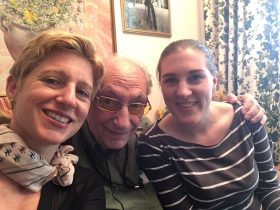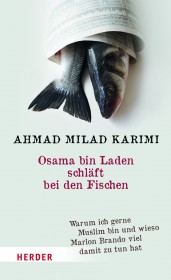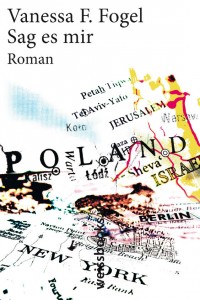The first entry in the series “Memories from the Life of Walter Frankenstein”

Walter Frankenstein with Anna Rosemann and Theresia Ziehe in Stockholm, 2017, Photo: Theresia Ziehe
I first had the pleasure of meeting Walter and Leonie Frankenstein in Stockholm in 2008. Back then, our meeting and the couple’s heartfelt partnership left a lasting impression on me. After 66 years of marriage, the Frankensteins still radiated love and a deeply held respect for each other. The author Klaus Hillenbrand, who tells the Frankenstein’s life story in Nicht mit uns (Not with Us), sums up this impression at the end of his book with a question he asks the couple: “Does ideal love exist?” Leonie looks at Walter. And Walter looks at Leonie. And then they give the shortest possible answer, as if speaking from one mouth: “Yes!”
→ continue reading
“New German Stories,” an event series launched in January 2014 as part of the Academy program, continues this evening, 10 March 2015, when Ahmad Milad Karimi, Professor of Islamic Philosophy and Mysticism at the University of Münster, presents his new book Osama bin Laden is sleeping with fishes (Osama bin Laden schläft bei den Fischen) at the Academy of the Jewish Museum Berlin. We put three questions to our guest, prior to the event.

Ahmad Milad Karimi: Osama bin Laden is sleeping with fishes (Bookcover) © Herder Publishers
Julia Jürgens: Dear Mr. Karimi, in your autobiography you bring together Western popular culture and the history of Islamic intellectualism, the translation of the Koran and your PhD thesis on Hegel, Persian mysticism and a penchant for mafia films. If I may make a question of your book’s subtitle: What does Marlon Brando have to do with the pleasure you take in being Muslim?
Ahmad Milad Karimi: That is a secret of the book, a secret concealed first and foremost by the fact that there is always more to people than the pigeonhole we like to keep them in.
Six years ago you published your new translation of the Koran. What motivated you to take up such a challenge and add a new translation to those already in existence?
The Koran is more than simply a book—it is → continue reading
or “Being who I am”
“The night before I fly to Germany to see my grandfather Mosha, I meet someone, take him home with me, and for the first time in my life, I sleep with a man.”

© weissbooks.w
Frankfurt am Main
This sentence begins the first chapter of the 2010 novel Sag es mir (Tell it to me) by Vanessa F. Fogel. The author was born in 1981 in Frankfurt and grew up in Israel. She introduces the first-person narrator of this autobiographical novel both as a granddaughter and as a confident young woman right from the start. And despite her imminent trip to the sites of extermination – she meets her grandfather in Berlin and they travel together to Poland – her emphasis is on vitality and the joys of living.
The Frankfurt publishing house weissbooks has now taken on another Jewish writer of “the third generation.” Channah Trzebiner is a lawyer, also born in 1981 in Frankfurt, where, unlike Fogel, she still lives. She has written Die Enkelin (The Granddaughter), which is more of “a kind of inner monologue” than a novel. This book also begins confidently: “I accept the woman that I am.” At once, however, the author alerts her reader to the difficult process underlying this claim:
“For years I cut off my connection to the innermost ‘I’ […], so that I could be the substitute for a life ended by murder. How I could have done otherwise? I’m called Channah after my grandmother’s youngest sister […].”
→ continue reading


